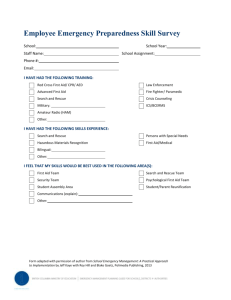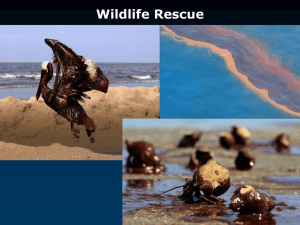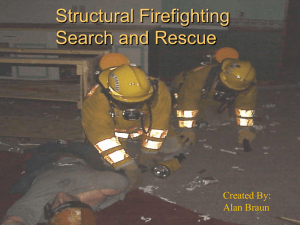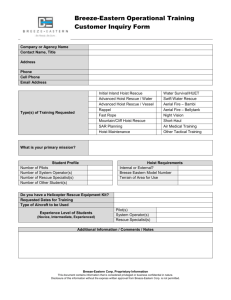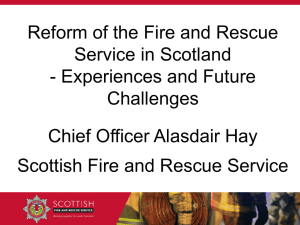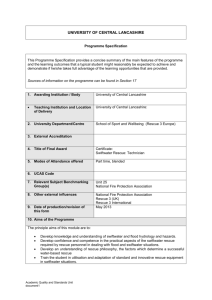Fc Technical Rescue Instruction Boat (Sept 2013)
advertisement
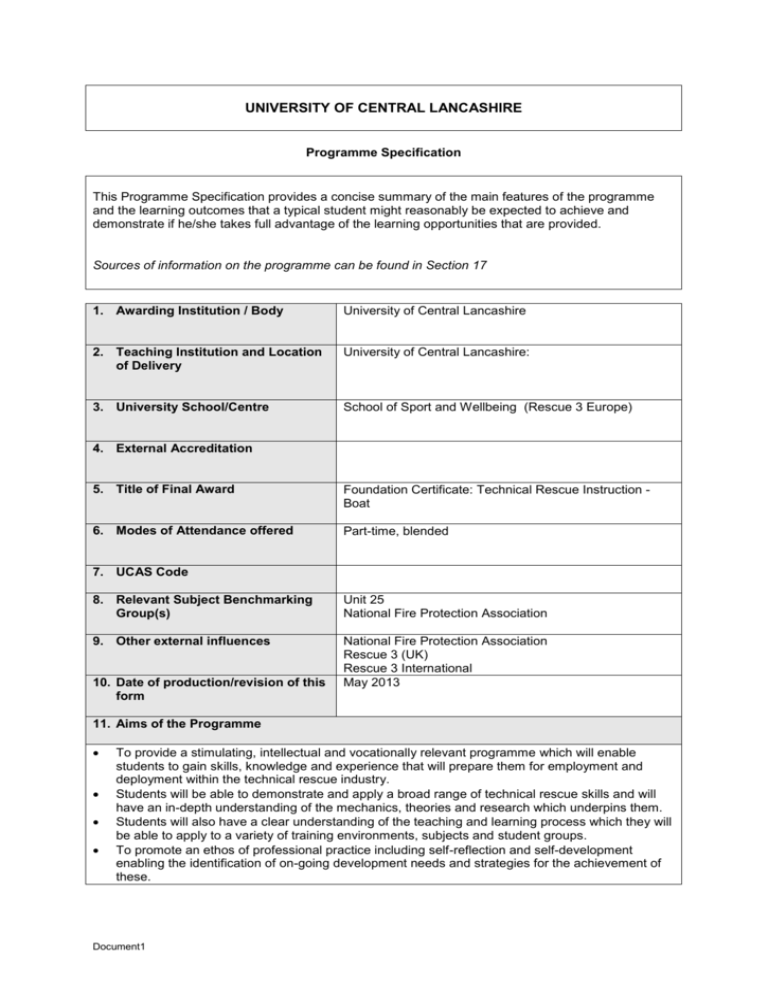
UNIVERSITY OF CENTRAL LANCASHIRE Programme Specification This Programme Specification provides a concise summary of the main features of the programme and the learning outcomes that a typical student might reasonably be expected to achieve and demonstrate if he/she takes full advantage of the learning opportunities that are provided. Sources of information on the programme can be found in Section 17 1. Awarding Institution / Body University of Central Lancashire 2. Teaching Institution and Location of Delivery University of Central Lancashire: 3. University School/Centre School of Sport and Wellbeing (Rescue 3 Europe) 4. External Accreditation 5. Title of Final Award Foundation Certificate: Technical Rescue Instruction Boat 6. Modes of Attendance offered Part-time, blended 7. UCAS Code 8. Relevant Subject Benchmarking Group(s) Unit 25 National Fire Protection Association 9. Other external influences National Fire Protection Association Rescue 3 (UK) Rescue 3 International May 2013 10. Date of production/revision of this form 11. Aims of the Programme To provide a stimulating, intellectual and vocationally relevant programme which will enable students to gain skills, knowledge and experience that will prepare them for employment and deployment within the technical rescue industry. Students will be able to demonstrate and apply a broad range of technical rescue skills and will have an in-depth understanding of the mechanics, theories and research which underpins them. Students will also have a clear understanding of the teaching and learning process which they will be able to apply to a variety of training environments, subjects and student groups. To promote an ethos of professional practice including self-reflection and self-development enabling the identification of on-going development needs and strategies for the achievement of these. Document1 12. Learning Outcomes, Teaching, Learning and Assessment Methods A. Knowledge and Understanding A1. Demonstrate a working knowledge of the techniques, skills, tactics and equipment that exist within the technical rescue industries. A2. Demonstrate an applied understanding of the ‘mechanics’ of the techniques; skills that are essential traits to become employed and deployed within technical rescue industries A3. Analyse the management/leadership concepts and issues applied to the engagement at all levels within the technical rescue industries. Teaching and Learning Methods Lectures, workshops, seminars, case studies, self-directed learning. Significant aspects of online learning and practical experience within their own practice / organisations. Assessment methods Practical skills assessments, multi choice exams, short answer exams, case studies, reports, portfolios, presentations. B. Subject-specific skills B1. Apply inter disciplinary skills in the facilitation, co-ordination and delivery of technical rescue activities. B2. Understand and apply into practice the current theories and examples of best practice within technical rescue industries. Teaching and Learning Methods Lectures, practical experience within their own practice / organisation, workshops, seminars, case studies, self-directed learning. Significant aspects of online learning Assessment methods Multi choice exams, short answer exams, case studies, reports, portfolios, presentations. C. Thinking Skills C1. Analyse a wide range of practical, theoretical and research data and its application to technical rescue context. C2. Display analytical, problem solving and reasoning skills in a practical, academic and vocational context. Teaching and Learning Methods Lectures, practical experience within their own practice / organisations, workshops, seminars, case studies, self-directed learning. Significant aspects of online learning Assessment methods Portfolios, reports, presentations, multiple choice exams, short answer exams, case studies. Evaluation of current research and application into practice. D. Other skills relevant to employability and personal development D1. Implement self determined action planning through self reflection and awareness for future progression D2. Operate both autonomously and within a team and demonstrate the skills and understanding required for effective leadership Teaching and Learning Methods Lectures, practical experience within their own practice / organisations, workshops, seminars, self-directed learning. Significant aspects of online learning Assessment methods Portfolio, presentations, reports, personal development plan. 13. Programme Structures* 14. Awards and Credits* Level Module Code Module Title Credit rating Level 4 TL1500 Document1 Core Modules: Swiftwater Rescue: Technician 20 Foundation Certificate: Technical Rescue Instruction - Boat Requires 80 credits at Level 4 & 40 credits at Level 5 TL1502 Swiftwater and Flood Rescue: Boat Operator 20 TL1505 Professional Practice Portfolio 20 TL1061 Rope Rescue: Operator Core Modules: Level 5 TL2505 Swiftwater and Flood Rescue: Boat Instructor 40 15. Personal Development Planning The programme incorporates significant aspects that relate to personal development planning. A strong focus is placed on the transfer and application of skills and knowledge into the workplace. Students are encouraged to develop their vocational skills through their work in the area and engage in professional practice modules. A personal tutoring support system is in place throughout the programme which supports students’ engagement and personal development. The programme benefits from dual accreditation with independent awards being presented by the University and Rescue 3 International / Rescue 3 (UK). Rescue 3 International / Rescue 3 (UK) certifies each associated module and students will receive certification from Rescue 3 International / Rescue 3 (UK) for each module they successfully complete. 16. Admissions criteria Programme Specifications include minimum entry requirements, including academic qualifications, together with appropriate experience and skills required for entry to study. These criteria may be expressed as a range rather than a specific grade. Amendments to entry requirements may have been made after these documents were published and you should consult the University’s website for the most up to date information. Students will be informed of their personal minimum entry criteria in their offer letter. Students must be engaged with the area of Technical Rescue, as demonstrated through employer sponsorship, work experience within the industry (paid or voluntary), prior experiential learning/training and/or educational attainment. These criteria are not pre-requisites for admission but will be considered along with previous life experience and a demonstrated enthusiasm for a career within/related to the Technical Rescue Industry. Access to a computer with a broadband connection and basic IT skills (ability to navigate web-pages & produce basic Word documents), are essential to engage with the blended learning aspects. Employer’s sponsorship of the student will contribute significantly to this demonstration of engagement. Students must have gained the First Aid at Work award or equivalent prior to being enrolled on the Swiftwater Rescue: Boat Instructor module. Students must be able to swim at least 25 metres to participate in the practical elements required for the Professional qualification (Rescue 3) aspects. 17. Key sources of information about the programme University Web Site: www.uclan.ac.uk/sport Factsheet University Prospectus Document1 UCLan Sport open days and applicant days Document1 5 LEVEL 4 18. Curriculum Skills Map Please tick in the relevant boxes where individual Programme Learning Outcomes are being assessed Programme Learning Outcomes Core (C), Compulsory Other skills relevant Module (COMP) or Knowledge and Subject-specific to employability and Level Code Module Title Option (O) understanding Skills Thinking Skills personal development Note: A1 A2 TL1500 Swiftwater Rescue: Technician Swiftwater and Flood Rescue: TL1502 Boat Operator TL1505 Professional Practice Portfolio CORE CORE CORE TL1061 Rope Rescue: Operator Swiftwater and Flood Rescue: TL2505 Boat Instructor CORE CORE A3 B2 C1 C2 D1 D2 B1 Mapping to other external frameworks, e.g. professional/statutory bodies, will be included within Student Course Handbooks Document1
